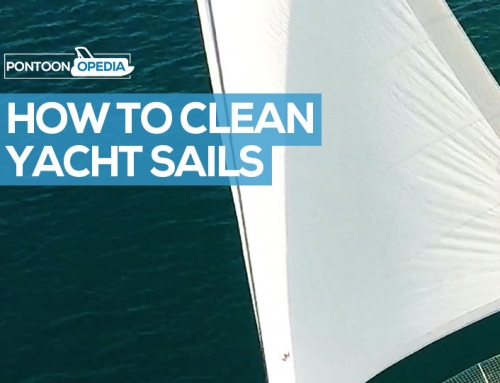If you love the open water, you might well have dreamed of leaving your traditional home and taking to the sea instead. While for many, this may seem like an insane idea, it is actually much more popular than you would think. However, it is not an easy process to switch from a traditional home to living on a large water vessel such as a yacht.
What size yacht can you live on? There are several answers to this question; the size yacht you need will depend on how many people will be living on the boat. Experts in this area recommend a yacht that is at least 30 feet long for one or two residents and 50 feet or more for families or those who want excess space.
When choosing a yacht to live on, you must consider how much room you will need to accommodate the items that you need. In the remainder of this article, we will further discuss the things that are both necessities for boat life and also amenities that you will want to have when needed.
Naturally, your yacht must be large enough to fit these items, and any excess space can be used for extras that make life on the water more enjoyable.
Table of Contents
Things to consider before living on a yacht
While the type and size of yacht needed are significant factors that you will want to consider before moving onto the water, they are not the only things to keep in mind.
Before you can make your final purchase, you will want to put a lot of time and consideration into what you purchase. Some basic things to keep in mind when it comes to your future yacht home are:
1. How often will you use your yacht?
The type of yacht you purchase and the size of the boat depends significantly on how much time you will be on it. If you plan to sell or stop renting your current residence and move onboard entirely, you will need more space.
However, if you are only using the yacht to live on during the summer months or for occasionally vacationing, you can handle a smaller boat.
2. What is your budget for a yacht?
You can find a variety of yachts available that are new or used and can range from under $100,000 to $1 million dollars or more. A new yacht is more expensive than a used option, but you will want to consider that used boats may come with repairs or renovation work.
Of course, the smaller the yacht then generally the less expensive it is, and the larger the yacht, the more expensive it is.
When you are considering the size and type of yacht you will purchase, you need to consider the budget you have in mind. If you are selling several belongings to move out onto the water, you can factor this money into your budget.
Also, you will want to consider the extra amenities that come with a newer yacht, which may be beneficial for those who want to live on the water long-term.
Consider the ongoing costs
When it comes to your budget, you will also want to consider the ongoing costs that come with yacht living, and larger boats tend to mean more annual costs. If you are unfamiliar with these costs, it is vital to educate yourself on some of the standard finances that come with boat living.
Some things to keep in mind when it comes to ongoing costs are:
- Insurance Costs – You will want to purchase boat insurance, which can be slightly more expensive than traditional homeowner’s insurance.
- Anchorage and Mooring Fees – If you plan to travel to new areas on your yacht, many popular places require the payment of fees to dock or use certain areas.
- HOA Fees – If you dock your floating home in one area, for the most part, you will see that these docks become an organized community. For most docks, there is an HOA or homeowner’s association that helps pay for ordinary expenses like utilizes and moorage upkeep. HOA fees can range from $200 to $750 monthly, depending on your area.
- Slip Fees – Similar to these HOA fees, marinas will charge slip fees that range from daily to long-term pricing. Slip fees will vary depending on the size of your yacht, the services that they offer, and the specific location that you are planning to dock. These fees can vary drastically with monthly costs ranging from only a couple hundred dollars to $1,000 or more.
- Utilities – Floating homes are tied to the dock when you are not out on the water, which is when you will also connect to utility services. Some standard utilities that marinas offer are cable, Internet, electricity, gas, water, and sewage. You will have to pay some fees for these utilities, and connecting to the dock is essential to do temporarily to keep boat life as pleasurable as possible.
- Maintenance – Of course, just like an average home, your boat home is bound to need some maintenance each year to keep it running smoothly. As long as there are basic maintenance needs, you can expect to pay $1,000 or less. However, if more significant issues arise for your yacht, more money will be spent.
3. How much space will you need to comfortably live?
As mentioned, this depends greatly on the number of individuals that will be living on the boat and the amount of time you will spend here. However, you will also want to consider the many factors mentioned above.
On average, larger boats mean higher costs, which you will want to ensure you can handle. You will want to choose a vessel that is closer to 30 feet for basic needs, but 50 feet for larger accommodations and more space.
One thing many experts say is to never opt for a boat that is too large for a single person to handle: in case of an emergency, you want one person to be able to get the ship to safety.
Positives and negatives to yacht living
Before leaping yacht living, you will want to think about all the positives and negatives that come with this lifestyle as well. It can be challenging to take the plunge into moving onto the water due to uncertainties, but there are many benefits of this choice worth considering. However, you should always be aware of the negatives as well.
Pros of yacht life
Many pros come with yacht living, and many prefer this style of living compared to owning a home. Some of the essential advantages that you will more than likely enjoy are:
- Enhanced Freedom – Many enjoy the idea of living on the water simply because of the increased freedom that you have. Depending on where you live, you can visit new areas and spend your days exploring new waters. This is an excellent option if you are older and want to retire onto the sea, where you can sail at your leisure.
- Simple, Laid Back Lifestyle – When you live on a yacht, you tend to have a more laid back and relaxed lifestyle. Most boat livers have a more minimalistic life and do not care as much about the materialistic aspects that others do. It is easy to spend your days drifting in your favorite lake or waterway away from the hustle and bustle of the world.
- The Close-Knit Community – Those living on houseboats, sailboats, yachts, and other floating homes are known for creating a close-knit community that can rely on each other. In fact, most boat livers find that they have a lot in common with others who live similarly. This close community is a huge reason that many begin and continue living on a yacht.
- You Are Close to Nature – When you live out on the water, you are closer to nature than ever before. Many who love water sports, fishing, hiking, and other outdoor activities enjoy living on boats because of this closeness to nature.
- It Improves Your Physical and Mental Health – Those who live on a boat tend to be more physically fit than those who live in a typical household, as there is an excess of physical activity on these homes. Also, for many, this improves their mental health because they get a break from the stressful “normal” world. Overall, it can be very beneficial to your overall health.
- Lowered Costs – Comparative to purchasing, maintaining, and living in a typical home, living on a yacht can actually save you money. In fact, those who live in bigger cities can save thousands by moving onto a floating home. Also, many individuals who live on boats still have regular employment and a social life outside of their boat home.
Cons of yacht life
Of course, as with all things in life, some negatives come with switching to a boat home. While there are some cons, you will want to weigh them along with the positives to see what works best for your personal life. Some disadvantages that come with boat living are:
- Negative Social Stigma – Unfortunately, there is a slightly negative connotation that comes with boat living, and many look down on this. In recent years, this idea of living on a yacht or a similar floating home has become more socially acceptable. However, if you do opt for this style of living, you will probably get some unnecessary judgment for it.
- Less Space/Items – A big part of living on a boat is that you will not have as much space as most homes have. This means that you may not have as many items or amenities as you are used to. This can be hard for some to adjust to.
- Unwanted Animals and Bugs – Since boats are not as secure as homes when it comes to keeping bugs out, you may have a few unwelcome visitors bothering you on board. You also have the added aspect of water bugs and animals that are inhabitants of the areas you will be living in.
- Bad Weather – When you live on a boat, bad weather has a much more significant effect on your daily life. You will want to check the weather regularly to ensure you are not on the water during a rough storm. Depending on your area, hurricanes or tropical storms may mean your home is off-limits at times.
- Inconvenient Location – Depending on where you dock your boat or the waters you frequent, you may not be in a convenient location. This means that accessing the places you need, like grocery stores, doctors, salons, etc. can be slightly inconvenient. This negative vastly depends on your location.
What will you need when living on a yacht
Of course, a huge part of deciding what size yacht you choose to live on will be in deciding what items you need to bring with you. Most who make the switch from a traditional home to a floating home will downsize quite substantially. This is simply because yachts have far less space than conventional homes have available.
If you plan to only use your floating home for short periods, you can save most of your larger items in your traditional home and only bring the necessities on board.
If you are entirely moving on board, you will want to downsize the extras and take the items you need with you onboard your boat. If there are certain items you cannot live without that you cannot find room for, consider renting a storage unit for extras.
There are some basics that you will want to keep on board for emergencies and essential use as needed. The top ten things you will want to have on your boat are listed below, most of which can be found online for purchase on Amazon should you need to stock up on items.
- Clothing – You will want to have enough clothing to last while you are on board. Doing laundry has its own challenges, especially on smaller boats. This makes having an adequate amount of clothing key to a pleasurable life on board.
- Sunscreen and Bug Spray – Since boat living often means you will spend long hours in the sun or exploring, having sunscreen is very important. Also, water tends to attract mosquitoes and other bugs that you will want to protect yourself from. Having bug repellent is essential to avoiding unwanted bites and protecting yourself.
- First Aid Kit – Having some basic first aid care on your yacht is also very important. You do not have to have an extensive medical kit, but the basics that are needed should an emergency happen. You can pick up a first aid kit at most stores or online on Amazon and add any extra medications or supplies you may fee important. You might also want to check out this list of essential safety items.
- Fire Extinguisher – While it may seem silly to think of a fire breaking out on the water, boats are not immune to catching flame. Having a fire extinguisher handy is essential should an issue arise.
- Life Jackets and Life Preservers – If you plan to use your boat for water activities as well, you will want to have a life jacket for each person living on the yacht along with any visitors. You also want to have a life preserver available should anyone ever fall off the boat.
- Emergency Flares – One of the downsides to living on the water is that you are far away from most emergency responders, and accidents can always happen. Having emergency flares onboard can help you alert those around you should you need extra help.
- Basic Maintenance Equipment – While you may bring your boat into the dock and consult a professional for larger maintenance jobs, you will want to be prepared for small maintenance work. You should have a simple marine toolkit on hand for little repairs like plumbing, electrical, and mechanical issues. You do not need extensive equipment, but merely enough to keep things running smoothly. Along with this, you will want to have basic cleaning supplies to use as needed.
- A Knife Set – While you may not need several knives, having a couple of quality knives is essential. This can be great for cutting rope snags or other issues around the boat. However, they can also be used for cooking purposes and other basic needs.
- Fresh Water – Though you are surrounded by water, you will want to ensure that everyone on board has safe drinking water that can be used when needed. You will also want to ensure you have an adequate supply of clean water for bathing and cooking purposes. It could be that you invest in an expensive watermaker for your yacht.
- Adequate Food Supply – Along with fresh water, you will want to have enough food to last you for at least a week. Most larger yachts will have a basic kitchen area that you can utilize while living on your boat. You will want to have enough food to live comfortably.
The above-listed items are those that you will always want to have onboard, but there are several things that you will want to add to make your life easier. Some amenities that you may wish to bring onboard that are relatively small but beneficial are:
- Hand-Held or Smaller Sized Vacuum – here are some recommendations
- Stove Top Coffee Maker
- Small Washing Machine
- iPad, Television, Internet, Cable, and Other Entertainment Options
- Watermaker or Fresh Water Dispenser
The last word…
The right size yacht you can live on will depend on multiple factors. Living on a yacht can be hard to imagine for those accustomed to living in a traditional home. However, as long as you have enough space on your vessel and the bare necessities, you can easily make it work.
Just make sure you consider the pros and cons of boat life and whether you are really ready to take the plunge.
If you are seriously considering living on a yacht, you might find the following content of interest:






